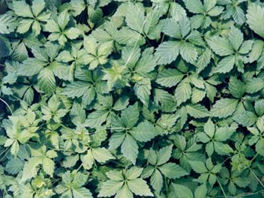Southern ginseng-Jiaogulan
The Latin name of Jiaogulan (pronounced jee-ow-goo-lahn), is Gynostemma pentaphyllum. Jiaogulan is also called Southern Ginseng, miracle grass or "Herb of Immortality", because of it's adaptogenic ability to restore balance and equilibrium to the body and mind.
This plant is growing in the wild in Southeast China, Japan and Thailand.
The main active biochemical components of Jiaogulan are the gypenosides. These gypenosides are closely related to the ginsenosides found in Ginseng and so are it's actions. There are 3-4 times as many saponins in jiaogulan as there are in ginseng.
Introduction
Although descriptions of it as a salutary herb date back to the Ming Dynasty (1368-1644 A.D.), jiaogulan was not widely known or used, even in China, because of the remote locations where it grew.Jiaogulan grows mostly in the mountainous regions of southern China, far from the central part of China, an area which has long been known as the "ancient domain of China".
This central area of China is where the classical system that we call TCM evolved. For this reason, jiaogulan is not included in the standard pharmacopoeia of the TCM system, and therefore has not had as widespread use as TCM herbs

|
Photo: Traditionally the locals used the vine and leaves of the wild Gynostemma plant as a vegetable or tea. |
Application
Of the Gynostemma plant actually only the aearial parts are used for salutary purposes. Jiaogulan is mainly orally consumed. It is often used as a tea and also used as a wholesome ingredient in soft and energy drinks. Increasingly Jiaogulan is used in food supplements and as a functional ingredient in food.Extracts made from the Gynostemma leaves and stems are used in proprietary preparations for cosmetics and anti-ageing tonics.
Beneficial for:
The leaves of the Gynostemma plant are considered to be a powerful adaptogen with the special ability of being able to restore homeostatis (balance and equilibrium) to the different body systems. The body systems include the cardiovascular, digestive, immune, nervous and reproductive systems. By restoring balance and equilibrium to these systems the body and mind become more harmonious.According to the Dutch Guidelines KOAG / KAG allowable terms, related to this product, are:
- Extra energy and resistance.
- Good for heart and blood vessels.
- Supports liver functions.
- Stimulates the immune system and nervous system.
- Lowering cholesterol levels and a balanced blood sugar during exercise / sports (performance).
- Beneficial for blood pressure.
Industrial application
As far as known there are beside the beneficial use no other industrial applications of Gynostemma pentaphyllum known.Dosage
Gynostemma appear to be safe even at large quantities. However, no scientific documentation is available to confirm a maximum dosage.It is advised to take 30-60 mg pure Gypenosides per person per day. This means that the advised quantity of dry herb is 600-1200 mg per person per day. The average content of gypenosides in the dried herb is about 5% gypenosides.
From an extract powder containing 80% gypenosides the high dosage is 25-50 mg per person per day.
For a cosmetic effect it is recommended to apply a minimum of 1-2 gram of Jiaogulan extract powder (80% ginsenoside content) per kilo product.
Contra-indications
In general Jiaogulan can be considered as safe to use. Nevertheless it is recommended to be careful in the following cases.- There is insufficient research on the safety of Jiaogulan during pregnancy and lactation, so it is better not to use it.
- Gynostemma can affect the ability of blood to clot after an injury.
- Use cautiously with diabetes.
More information / news
Copyright © 2011 Benseng Foodsupplements BV, Veghel, The Netherlands. See: www.benseng.nl
 |
 |
| previous | next |
